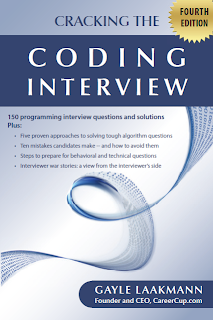click here to dowload this book.......
how to face coding interview is not a cup of tip.here is few tips which can help you .........
The first thing to know about a programming or tech job interview is that you're likely to be interviewed by other programmers--the people you will work with. Although you'll likely make a quick pass through Human Resources to give over your background, the final decision will often be made by your future (or not so future) coworkers.
This gives you a great opportunity to evaluate the company--do you want to work with these people? Do they seem to know what they're doing? Can you get along with them--can you learn from them? They're working on the newest projects, so you can actually ask them about the work and the working conditions.
One advantage of looking at the interview as both a chance to be evaluated and to evaluate is that you can maintain a good balance of power in the room. You don't need to feel as though you're the one who's under all of the pressure. The company, too, needs to impress you enough for you to want to work there. Don't let this become cockiness, but you don't need to let the interviewer run you over and leave you hanging out to dry. If he's a jerk, you don't want to work there anyway, right?
Dress based on how you are expected to dress. If the company tells you that they don't care if you wear a suit or not, then you probably can take it at face value. If they don't make it clear that they don't mind what you wear, better to play it safe and risk overdressing with a suit than to risk underdressing. If nothing else, you don't want what you wear to distract you during the interview. You don't want to be wondering, "do I look all right?" Just take care of it in advance and don't sweat it.
Nevertheless, it helps to be prepared for them. There are a couple of types of brain teasers: the ah-ha question, the deductive reasoning problem, and the more open-ended questions.
Generally, a good strategy is to show your problem solving skills. Even if you don't get the answer, you can salvage the situation by showing that you understand how to approach a problem.
The first thing to know about a programming or tech job interview is that you're likely to be interviewed by other programmers--the people you will work with. Although you'll likely make a quick pass through Human Resources to give over your background, the final decision will often be made by your future (or not so future) coworkers.
This gives you a great opportunity to evaluate the company--do you want to work with these people? Do they seem to know what they're doing? Can you get along with them--can you learn from them? They're working on the newest projects, so you can actually ask them about the work and the working conditions.
One advantage of looking at the interview as both a chance to be evaluated and to evaluate is that you can maintain a good balance of power in the room. You don't need to feel as though you're the one who's under all of the pressure. The company, too, needs to impress you enough for you to want to work there. Don't let this become cockiness, but you don't need to let the interviewer run you over and leave you hanging out to dry. If he's a jerk, you don't want to work there anyway, right?
Presentation
The more quickly you can establish a rapport with your interviewer, the better. Always be sure to respect the interviewer, but don't be afraid of being yourself. If they don't like your manner, you probably don't want to work for them. At the same time, there are standards that you are expected to maintain during an interview--don't talk about your last drunken adventure, medical ailments, or the like.Dress based on how you are expected to dress. If the company tells you that they don't care if you wear a suit or not, then you probably can take it at face value. If they don't make it clear that they don't mind what you wear, better to play it safe and risk overdressing with a suit than to risk underdressing. If nothing else, you don't want what you wear to distract you during the interview. You don't want to be wondering, "do I look all right?" Just take care of it in advance and don't sweat it.
Your Resume
Be prepared for your resume to be a point of discussion. You can practice explaining the different portions of your resume in advance, but don't script things too much. An interview should flow somewhat loosely and you don't want to end up embarassing yourself by repeating information that you already told the interviewer in reply to another question.The Interview Questions
Aside from the general background questions based on your resume, you're likely to be asked some more technical or brain-teaser type questions.Brain Teasers
Brain teasers are probably the most intimidating type of interview question. There's a sense in which your ability to answer some dumb riddle is associated with your IQ. It's also tricky to prepare for a brain teaser because there are no set-in-stone techniques you can apply.Nevertheless, it helps to be prepared for them. There are a couple of types of brain teasers: the ah-ha question, the deductive reasoning problem, and the more open-ended questions.
Generally, a good strategy is to show your problem solving skills. Even if you don't get the answer, you can salvage the situation by showing that you understand how to approach a problem.
- State your assumptions
- Ask intelligent questions
- Talk out loud, show your thought process
- Draw pictures or diagrams

No comments:
Post a Comment